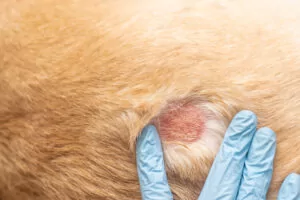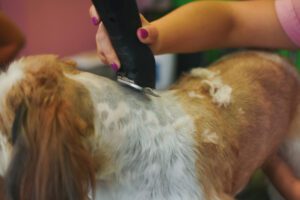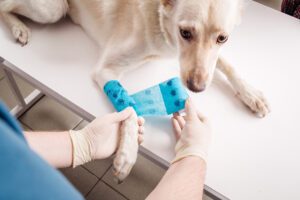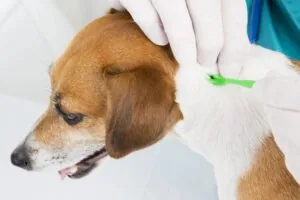What is a Hotspot? Are Dog Hotspots Contagious?
Have you ever seen an infected lesion or sore on your dog and wondered what it is? If your pup is licking, chewing, or scratching at the area and it looks inflamed and red, your canine companion may have a hotspot. So, what is a hotspot and are hotspots on dogs contagious?
Hotspots in dogs that arise due to bacteria are typically not contagious. However, if the hotspot is caused by scabies, parasites, or a fungal infection, it can spread to other pets and humans. It is essential to have it looked at by a vet who can determine the underlying cause of the hotspot.
Hotspots are itchy and painful for your dog, and getting them treated promptly will help them feel better. If you want to know more about hot spots on dogs and when they are contagious, peruse this article.

What Are Hotspots?
In the medical world, hotspots are called canine acute moist dermatitis. The hotspot begins as a small red bump, which many pet parents mistake for an insect bite. You may see your dog licking, itching, or biting the bump, which causes a red, oozing sore or lesion.
At this point, the sore will quickly grow and become infected, and your pup will have a hard time leaving it alone.
What Causes Hotspots on Dogs? 
You may be wondering why the hotspot appears in the first place. As your dog licks and chews the area, it becomes more extensive, and the skin will grip the moisture from the constant licking and perpetuating the sore, which leads to infection. The following are some underlying causes of hotspots:
- Poor grooming habits cause hair to be matted or dirty, creating an environment ripe for bacteria
- Separation anxiety can trigger extreme boredom or loneliness and can lead to self-destructive tendencies
- Anal sac disease can lead to abscesses from constant chewing or licking of the area around the anus
- Skin infections may be the culprit as fungi and bacteria can cause infection
- Atopic dermatitis (eczema) causes dry, itchy, irritated skin
- Allergies from food, seasonal, fleas, or skin
- Parasites such as ticks, lice, or mites cause severe itchiness
- Contact irritants like poison ivy
Ear infections can also trigger skin irritation and excessive scratching, leading to a hotspot. If your dog has arthritis, they may lick achy joints repeatedly, causing a hotspot. Bacterial imbalance is caused by licking and biting, and the immune system reacts, creating a cycle of more itching, licking, and biting.
What Are the Symptoms of Hotspots?
Hotspots start with an itchy, painful patch of skin that your pup will irritate by licking, scratching, and biting. Pain is the result of all the attention paid to the localized site. The following are some indicators of hotspots:
- The licking, chewing, scratching cycle
- Inflammation and redness
- Dry, scaly skin
- Hair loss
Moist, matted fur and a foul odor coming from the site are also symptoms of hotspots. There may also be crusty scabs or oozing sores and lesions. Your dog’s mood may become negative, as they may be depressed or aggressive due to pain.
What is Treatment for Hotspots?

The first thing to do when you see that your dog has a hotspot is to take your pup to the vet to diagnose the problem and get it adequately clipped and cleaned. You want to have any underlying health concerns treated as well. The following includes the steps your vet will take to treat the hotspot:
Shaving or Clipping Around the Infected Area
Your vet will shave or clip the hair around the infected area to help the moist lesion dry, making it easier to treat. It will also keep hair from encroaching into the open sore. Matted hair can trap bacteria in the skin, which worsens the hotspot. Clipping it away is a huge help.
Effectively Cleaning the Hotspots
An antiseptic cleaning solution, like chlorhexidine, will help clean the area. Cleaning the site is essential to remove any dirt that can cause inflammation. The chlorhexidine solution will help kill bacteria. Apply a warm compress three times a day to help with cleanliness and circulation.
Applying Topical Antibiotics
Your vet may prescribe topical antibiotics, or you can use a first aid cream, like Neosporin, if your vet recommends it. You should apply it three or four times daily. Ensure you use the cream, not the ointment, on your dog. Mupirocin can be applied to remedy bacterial infections. Your vet will know what is best.
Using Oral Antibiotics
Your dog may also be prescribed oral antibiotics, as some infections are more severe than others. The best way to treat skin infections is to give the pup oral antibiotics, which will be carried to the bloodstream, and clear out the bacteria.
The Vet May Prescribe Steroids or Antihistamines
If the hotspots are severe enough, your vet may prescribe steroids. Steroids can decrease inflammation and help ease pain caused by hotspots. Antihistamines may also be given to control the itchiness. Your vet may also recommend using Benadryl. The standard formula is one mg per pound of body weight, but always check with your vet just to be safe.
“Cone of Shame”
Your pup may also need the “cone of shame,” also known as an Elizabethan collar, to keep them from scratching, licking, or chewing at the site while it is healing. You can also cover it with a band-aid to prevent your dog from getting to the hotspot.
Are Hotspots Contagious? 
It is common for pet parents to wonder if hotspots are contagious. These sores or lesions can form and spread rapidly, but most hotspots are caused by bacteria and are not infectious. However, hotspots caused by scabies, parasites, or fungal infection can spread to other pets and humans.
Your vet can determine the underlying cause of the hotspot by taking a sample and running a culture of the skin scraping. It is essential to help prevent hotspots from developing by regularly grooming your dog, practicing flea and tick prevention, and ensuring allergies are promptly treated.
Conclusion
Hotspots are incredibly itchy and painful for your dog. If you see any symptoms mentioned in this article, you should get your pup to the vet immediately. It is important to note that hot spots caused by bacteria are not contagious. However, hotspots caused by scabies, parasites, or fungal infections can spread to other pets and humans.
For pet parents in the Lewisville, NC area, Shallowford Animal Hospital is here to help you and your pet. Give us a call at (336) 945-4412 or make an appointment online.
Share This Post
Recent Posts
About Shallowford Animal Hospital
Shallowford Animal Hospital and The Pet Spa at Shallowford are dedicated to the exceptional, compassionate care your pet deserves. Pets hold a very special place in our families, and we treat yours like our own.



